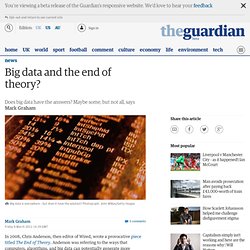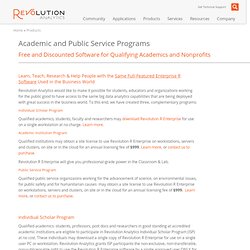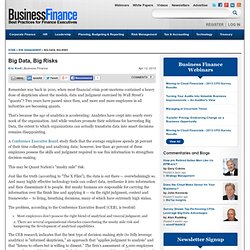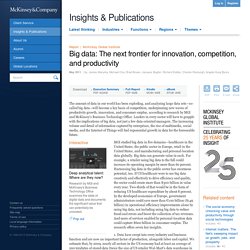

Big data and the end of theory? In 2008, Chris Anderson, then editor of Wired, wrote a provocative piece titled The End of Theory.

Anderson was referring to the ways that computers, algorithms, and big data can potentially generate more insightful, useful, accurate, or true results than specialists ordomain experts who traditionally craft carefully targeted hypothesesand research strategies. This revolutionary notion has now entered not just the popular imagination, but also the research practices of corporations, states, journalists and academics. The idea being that the data shadows and information trails of people, machines, commodities and even nature can reveal secrets to us that we now have the power and prowess to uncover.
In other words, we no longer need to speculate and hypothesise; we simply need to let machines lead us to the patterns, trends, and relationships in social, economic, political, and environmental relationships. There can by no denying the significant power and potentials of big data. Download Revolution R - Free for Academia - Revolution Analytics. Learn, Teach, Research & Help People with the Same Full-Featured Enterprise R Software Used in the Business World Revolution Analytics would like to make it possible for students, educators and organizations working for the public good to have access to the same big data analytics capabilities that are being deployed with great success in the business world.

To this end, we have created three, complementary programs: Individual Scholar Program Qualified academics, students, faculty and researchers may download Revolution R Enterprise for use on a single workstation at no charge. Learn more. Academic Institution Program Qualified institutions may obtain a site license to use Revolution R Enterprise on workstations, servers and clusters, on site or in the cloud for an annual licensing fee of $999. Revolution R Enterprise will give you professional-grade power in the Classroom & Lab. Public Service Program Individual Scholar Program Limited Technical Support.
Big Data, Big Risks. Remember way back in 2010, when most financial crisis post-mortems contained a heavy dose of skepticism about the models, data and judgment exercised by Wall Street's "quants"?

Two years have passed since then, and more and more employees in all industries are becoming quants. That's because the age of analytics is accelerating: Analytics have crept into nearly every nook of the organization. And while vendors promote their solutions for harvesting Big Data, the extent to which organizations can actually transform data into smart decisions remains disappointing. A Conference Executive Board study finds that the average employee spends 36 percent of their time collecting and analyzing data; however, less than 40 percent of these employees possess the skills and judgment required to use this information to strengthen decision-making. This may be Quant Nation's "mushy mile" risk. Just like the truth (according to "The X Files"), the data is out there -- overwhelmingly so. Related Articles: Big data: The next frontier for innovation, competition, and productivity.
The amount of data in our world has been exploding, and analyzing large data sets—so-called big data—will become a key basis of competition, underpinning new waves of productivity growth, innovation, and consumer surplus, according to research by MGI and McKinsey's Business Technology Office.

Leaders in every sector will have to grapple with the implications of big data, not just a few data-oriented managers. The increasing volume and detail of information captured by enterprises, the rise of multimedia, social media, and the Internet of Things will fuel exponential growth in data for the foreseeable future. MGI studied big data in five domains—healthcare in the United States, the public sector in Europe, retail in the United States, and manufacturing and personal-location data globally. Big data can generate value in each. For example, a retailer using big data to the full could increase its operating margin by more than 60 percent. 1. 2.
Podcast 3. 4. 5. 6. 7.